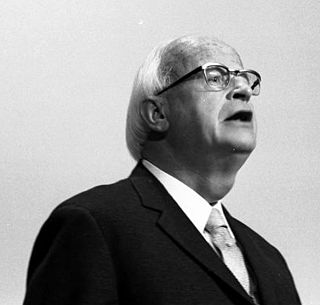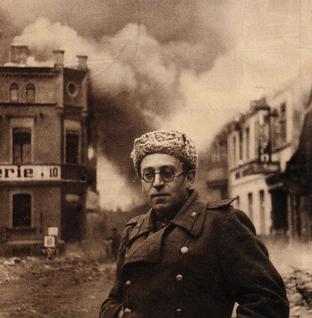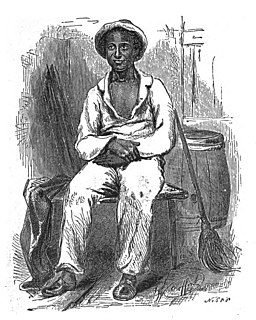A Quote by Marcus Aurelius
It is right that man should love those who have offended him. He will do so when he remembers that all men are his relations, and that it is through ignorance and involuntarily that they sin,--and then we all die so soon.
Related Quotes
Jesus did not identify the person with his sin, but rather saw in this sin something alien, something that really did not belong to him, something that merely chained and mastered him and from which he would free him and bring him back to his real self. Jesus was able to love men because he loved them right through the layer of mud.
If you can impress any man with an absorbing conviction of the supreme importance of some moral or religious doctrine; if you can make him believe that those who reject that doctrine are doomed to eternal perdition; if you then give that man power, and by means of his ignorance blind him to the ulterior consequences of his own act,-he will infallibly persecute those who deny his doctrine.
There are two men in each one of us: the scientist, he who starts with a clear field and desires to rise to the knowledge of Nature through observations, experimentation and reasoning, and the man of sentiment, the man of belief, the man who mourns his dead children, and who cannot, alas, prove that he will see them again, but who believes that he will, and lives in the hope – the man who will not die like a vibrio, but who feels that the force that is within him cannot die.
To free a man from suffering, he must be set right, put in health; and the health at the root of man's being, his rightness, is to be free from wrongness, that is, from sin. A man is right when there is no wrong in him. I do not mean set free from the sins he has done: that will follow; I mean the sins he is doing, or is capable of doing; the sins in his being which spoil his nature — the wrongness in him — the evil he consents to; the sin he is, which makes him do the sin he does.
What I have always loved most in men is imperfection. I get moved by the wrinkles on the throat of a man. It makes me love him more. I think it is sad that more women don't take the chance that maybe men will be moved by seeing the chin a little less firm than it used to be, that a man will be more in love with his wife because he remembers who she was and sees who she is and thinks, God, isn't that lovely that this happened to her. And be moved by life telling its story there.
Our God...is a consuming fire. And if we, by love, become transformed into Him and burn as He burns, His fire will be our everlasting joy. But if we refuse His love and remain in the coldness of sin and opposition to Him and to other men then will His fire (by our own choice rather than His) become our everlasting enemy, and Love, instead of being our joy, will become our torment and our destruction.
... so our customary practice of prayer was brought to mind: how through our ignorance and inexperience in the ways of love we spend so much time on petition. I saw that it is indeed more worthy of God and more truly pleasing to him that through his goodness we should pray with full confidence, and by his grace cling to him with real understanding and unshakeable love, than that we should go on making as many petitions as our souls are capable of.
Look now — in all of history men have been taught that killing of men is an evil thing not to be countenanced. Any man who kills must be destroyed because this is a great sin, maybe the worst sin we know. And then we take a soldier and put murder in his hands and we say to him, 'Use it well, use it wisely.' We put no checks on him. Go out and kill as many of a certain kind or classification of your brothers as you can. And we will reward you for it because it is a violation of your early training.
At such times, the heart of man turns instictively towards his Maker. In prosperity, and whenever there is nothing to injure or make him afraid, he remembers Him not, and is ready to defy Him; but place him in the midst of dangers, cut him off from human aid, let the grave open before him, then it is, in the time of his tribulation, that the scoffer and unbelieving man turns to God for help, feeling there is no other hope, or refuge, or safety, save in his protecting arm.
Christ prayed for those that crucified Him: 'Father, count not this sin against them; they know not what they do.' Archdeacon Stephen prayed for those who stoned him so that the Lord would not judge this sin against them. And so we, if we wish to retain grace, must pray for our enemies. If you do not find pity on a sinner who will suffer in flames, then you do not carry the grace of the Holy Spirit, but rather an evil spirit; and while you yet live, you must free yourself from his clutches through repentance.
A guide, on finding a man who has lost his way, brings him back to the right path—he does not mock and jeer at him and then take himself off. You also must show the unlearned man the truth, and you will see that he will follow. But so long as you do not show it him, you should not mock, but rather feel your own incapacity.
A man who fears not God, will break all his laws with an easy conscience, but one who is the favorite of heaven, who has been indulged to sit at royal banquets, who knows the eternal love of God to him, cannot bear that there should be any evil way in him that might grieve the Spirit and bring dishonor to the name of Christ. A very little sin, as the world calls it, is a very great sin to a truly awakened Christian.









































